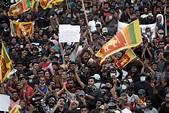Sri Lanka’s Crisis:

Sri Lanka, a country of 22 million people, is under the grip of an unprecedented economic turmoil, the worst in seven decades, leaving millions struggling to buy food, medicine, fuel and other essentials.
- Following the political and economic instability, hundreds of anti-government protesters stormed into the Sri Lankan President’s residence demanding his resignation.
- When Sri Lanka emerged from a 26-year long civil war in 2009, its post-war GDP growth was reasonably high at 8-9% per annum till 2012.
- However, its average GDP growth rate almost halved after 2013 as global commodity prices fell, exports slowed down and imports rose.
- Sri Lanka’s budget deficits were high during the war and the global financial crisis of 2008 drained its forex reserves which led to the country borrowing a USD2.6 billion loan from the IMF in 2009.
- It again approached the IMF in 2016 for another USD1.5 billion loan, however the conditionalities of the IMF further deteriorated Sri Lanka’s economic health.
- The Easter bomb blasts of April 2019 in churches in Colombo resulting in 253 casualties, consequently, dropped the number of tourists sharply leading to a decline in foreign exchange reserves.
- The newly led government by Gotabaya Rajapaksa in 2019 promised lower tax rates and wide-ranging SoPs for farmers during their campaign.
- The quick implementation of these ill-advised promises further exacerbated the problem.
- The Covid-19 pandemic in 2020 made the bad situation worse –
- Exports of tea, rubber, spices and garments suffered.
- Tourism arrivals and revenues fell further
- Due to a rise in government expenditures, the fiscal deficit exceeded 10% in 2020-21, and the debt to GDP ratio rose from 94% in 2019 to 119% in 2021.
- The Crisis in Sri Lanka is triggered due to a shortage of foreign exchange (forex) reserves, which have dropped by 70% over the last two years to just USD 2 billion by the end of February 2022.
- Meanwhile, the country has foreign debt obligations of about USD 7 billion for 2022.
- Sudden Move to Organic Farming: In 2021, all fertiliser imports were completely banned and it was declared that Sri Lanka would become a 100% organic farming nation overnight.
- This overnight shift to organic fertilisers heavily impacted food production.
- Consequently, the Sri Lankan President declared an economic emergency to contain rising food prices, a depreciating currency, and rapidly depleting forex reserves.




